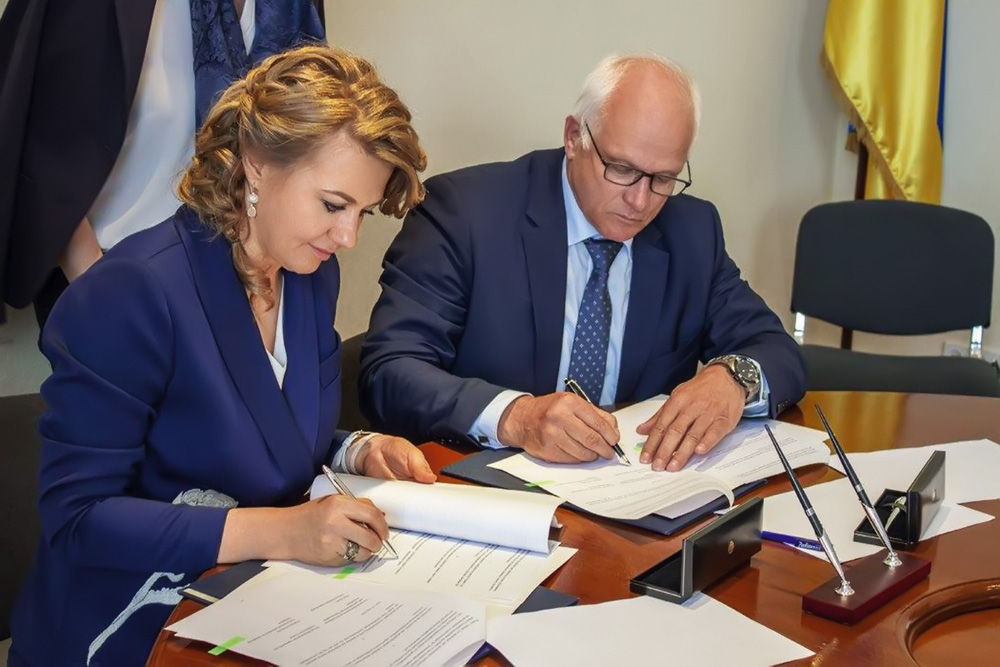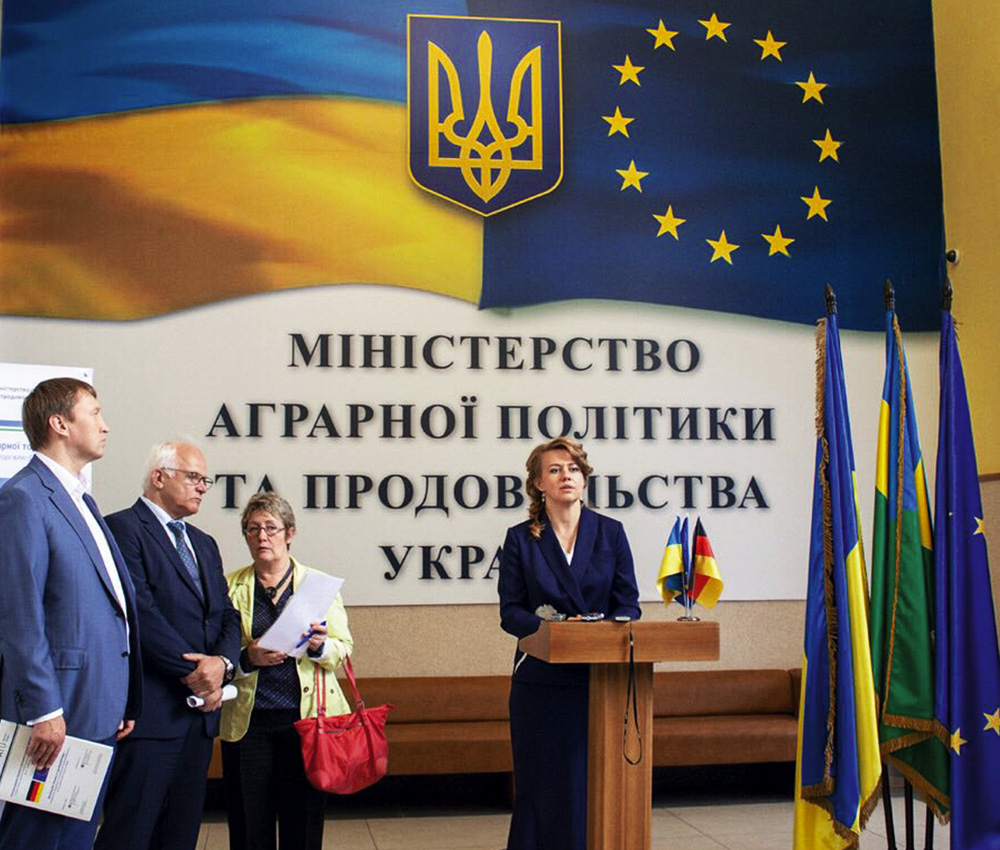Vladyslava Rutytska: Indeed, Ukraine has every chance to become an agrarian superstate, that is a country with a modern agroindustrial sector, which develops state-of-the-art technologies and pioneers their use in the world. We have unique geography, wonderful soil and decent infrastructure.
Ukraine has every chance to become a state where agribusiness is based not on exports but on production and distribution of products with high added value, where agriculture drives the economy and creates hundreds of thousands of jobs in related sectors. Ukraine has never been a commodity economy and by no means should it slide down to this model. Today Ukraine is increasing the exports of products with high added value.
As a former deputy agrarian policy minister were in charge of the European integration, you oversaw a project with the World Bank to amend the land law and open the land market. What has been done or not yet done on these important matters?
The IMF insists that Ukraine must open the land market and develop a legal framework for this.
As long as there is no transparent and quality land market in Ukraine, we are losing enormous investment opportunities. A relevant bill has been submitted. We propose quality land auctions to open the land market and pilot projects in the land market so that we could test them on both commercial and state-owned land.
There are many big corporations in Europe and Asia which see serious prospects for their business in Ukraine. A supertask for Ukraine is to improve its investment climate. What specific steps can realistically be taken in 2018?
For this, we need to understand what was achieved in 2017. We considered several reforms of vital importance to Ukraine's development. These are healthcare, education and public service reforms and privatisation of state-owned enterprises.
Given our focus on agribusiness, let us have a more detailed look at the latter two: public service and privatisation of big businesses.
Public service reform suggests that leading experts will be selected in a transparent competition and public offices will pay professionals on par with European salaries (using EU grants). Namely these people will be responsible for forming the ministries' policies.
Neighbouring Poland's successful experience is very useful for us. Back in the early 1990s, Poles reformed their public services by creating an alternative to the Agriculture Ministry, FAPA Fund, with the help of the World Bank. Market specialists came to work for the Fund and, having completed management training, moved to the ministry to replace old officials. Thus, the official corps was replaced with quality staff and the ministry could focus on its main task – to form policies and strategies.
Read: Dziva Krayina: Ukrainian Bumblebee Paradise
Image: Mrs Rutytska with German Agriculture Secretary Peter Bleser
I have been a deputy agriculture minister for two years and I know what problems should be tackled and whose experience can be used as a platform to rely upon. My duty as a deputy minister was to harmonise our Ukrainian legislation with that of the EU. This is an incredibly laborious process. In Ukraine, we have adopted a practice under which we elaborate the laws in great detail and adapt them to European requirements with regard to the national component and interests of national manufacturers.
There is a close link to the next reform, privatisation of state-owned enterprises. There are more than 3,500 big enterprises working under the management of ministries in Ukraine. For example, there are fewer than 300 state-owned enterprises in Poland and Hungary. Among developed countries, the USA has three such companies and Canada has none. These figures are telling! There will be no quality change of the investment climate without reforms and privatisation! Besides, international investors should be confident that there will be open privatisation and that the state will be fairly prepared to make such steps.
How well, you think, is the state prepared to make this step?
I would say it is moderately prepared. I will explain why: if we analyse the past three years (from 2014 to 2016), we will see that ministries transfer one to three, five at most, enterprises a year on average to the State Property Fund which directly oversees privatization. At a pace like this, we cannot be effective. In the meantime, ministries are tasked to transfer dozens of enterprises a year. Impediments include imperfect legislation and absence of profound preparation on the part of both the State Property Fund and ministries. That is why it is important to implement the new law which had its first reading in parliament not so long ago, in September 2017, and is now being prepared for the final vote. Its adoption will give us a chance to change and speed up the process.
International investors should be confident that everything is done in an open and transparent manner and that, if necessary, they will be able to appeal to international courts.
As far as the sale of big enterprises is concerned, I should say that it is important to involve an international investment consultant. For example, this can be SigmaBleyzer or some other fund specialising in a particular field. Why would you need a consultant? A reputable international consultant will do a full analysis of a company, provide you with comprehensive information about international funds which may be interested in it and prepare an asset for an international auction. It has been a common international practice for a long time. Assets sell higher at broad and transparent auctions, which is good for the state budget.
There is a platform similar to ProZorro for privatisation of small and medium-sized businesses. When this platform is launched, we will be able to monitor assets for sale online and compete by bidding for them.
How can privatisation be boosted?
This problem requires a pragmatic and surgically sharp decision on the spot. Otherwise, corruption will fester in the next five years. It is necessary to create conditions in which corruption will become impossible at all. In the case of state-owned enterprises, the only solution is transparent and well-prepared privatization.
Image: Vladyslava Rutytska was the deputy agrarian policy minister in charge of European integration to September 2014 to August 2016 and continues to advise the minister up to date.
As far as state-owned companies, for instance, Artem Sil or UkrSpyrt in the agrarian sector, are concerned, we mostly hear about them because of corruption cases (someone was imprisoned, someone fled abroad and so on). This happens all the time. This problem did not emerge a year or seven years ago… Unless state-owned enterprises grabbing loans all the time are sold to private owners, we and our children will have to carry this burden.
The announced reforms will be assessed depending on how well we carry out privatisation (and international donors are closely following this process!): whether these reforms are of high quality and whether there is political will for them. Faith in Ukraine depends on this. I saw one letter to our government from top international institutions saying the following: if you imitate reforms, we will pretend we are supporting you financially…
How has the business culture in Ukraine changed since the 2014 events, in your opinion?
Due regard must be given to reforms carried out in 2015-2016. For example, banking reform was gladly welcomed by the international community. The banking system had to be purged of pocket banks with bloated loan portfolios and murky transactions.
The launch of the ProZorro system was one of the big achievements in 2015-2016. However, it is important that we do not stop. As they say in Japan, slow and steady wins the race. Certainly, all international investors agree that judicial reform must be the next one. The emergence of trustworthy courts in Ukraine will change the climate in the country for the better in earnest. And this is the main task for 2018. We need to prove that we are capable of more just announcing this reform but implementing it with confidence that it will move on over the next 10 or 20 years.
We need to come a long way of "whitewashing" our economy, which is a huge task for 2018 and any other year. The better work we do with "whitewashing" our economy, the more opportunities we will have to move ahead.
I believe that investment inflow in Ukraine will result in the upgrade of technologies, new jobs, proper financial accounting and tax payment, thus boosting the country's economy as a whole.
Despite numerous issues with the economy and the armed conflict in the east, the number of expats in Ukraine has been growing year on year. What is the reason, you think?
If we look at the boards of directors at large national companies, we will see a fairly big number of expats among its members. Our owners trust expats for two basic reasons: the first is their professional skills, the other one is the previous lack of exposure to corruption. And these two factors are decisive.
What advice would you give to a foreigner who has just come to live and work in Ukraine?
Image: Vladyslava Rutytska with Mr Roman Vashchuk, the Ambassador Extraordinary and Plenipotentiary of Canada. In July 2015, Ukraine and Canada signed a document on the completion of negotiations on the establishment of a free trade zone.
Personally, I know quite a few expats who have worked here for many years, met the love of their life and built families here while sincerely embracing our land. Many of them invested in Ukraine and are now developing their personal projects. These people came to know Ukraine as a warm and beautiful country with wonderful people, good climate, vast opportunities and big profits. Perhaps, I should wish they retain and multiply all of these.
As for those who are making their first steps making money here, I wish them courage and resolution to see their projects implemented! Let the success stories of those expats who found true happiness in our country inspire them.
Ukraine Must Become an Agrarian Superstate
The Food and Agriculture Organisation of the United Nations expects the world population to reach 10 billion people by 2050, which will boost demand for food. Can Ukraine leap at the chance and become a key player in the food market? What windows of opportunity are open today? Vladyslava Rutytska, a member of National Reform Council, vicepresident of SigmaBleyzer and AgroGeneration, has shared her views on these and other topical agribusiness issues with us.







